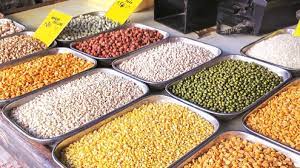Derivative trade in 7 agricultural commodities is banned.


Sebi has blocked the issuance of new contracts for non-basmati paddy, wheat, soyabean and its derivatives, crude palm oil, and moong until further directives are issued. Among the items on the list are chana and mustard seeds, as well as their derivatives.
The Securities and Exchange Board of India (Sebi) prohibited the derivative trade of seven agricultural commodities on the National Commodities and Derivatives Exchange (NCDEX) futures platform for a year on Monday.
With immediate effect, the regulator has prohibited derivative contracts trade in chana, wheat, non-basmati paddy, soyabean and its derivatives, mustard seed and its derivatives, crude palm oil, and moong for a year. “No new contract will be initiated until more orders are received.” There will be no new positions available for running contracts. Only position squaring will be permitted,” Sebi stated on Monday. Sebi had already prohibited the trade of chana and mustard seed derivatives on August 16 and October 8, respectively.
Most shopkeepers who contacted to The Indian Express claimed the move was made to keep food inflation under control before the elections in five states, including Uttar Pradesh.
Buyers and sellers on the NCDEX’s trading platform may place commodities on sale for a “Future’s” date. If either the buyer or seller failed to respect these contracts, they might opt out for a minimal charge. Futures contracts provided relatively reliable information about commodity price movements and served as a guide for hedging. However, speculative trade complaints had shaken the market, prompting several trade organizations to call for a ban on it.
While chana (Bengal Gram) has been removed from the list for the previous three months, the inclusion of rabi commodities such as wheat, mustard, and moong has caused consternation in the trade.
Some Latur traders believe the move demonstrates policymakers’ concern about rabi output in light of the fertilizer deficit in many regions of the nation. By prohibiting futures trading, the government is attempting to protect the market from any price shock that may occur in the coming days if output falls short of expectations.
Soybean has been on the radar due to the commodity’s consistent price growth over the last year and a half. The poultry sector has repeatedly demanded a prohibition on futures contracts on the oilseed, which they said was monopolized by speculators. Indeed, the Rajasthan Khadya Padarth Vyapar Sangh applauded the judgment in a press release. “This will liberate the kitchen from the grips of speculators,” according to the statement.
Physical markets, according to traders and processors, will follow supply and demand fundamentals.
Most traders, however, saw this decision as regressive, and it pushed the fledgling commerce in commodities markets back years. Many thought that this action removed the only indicators that the trade and farmers had regarding future price movements. According to Vilas Uphade, director of the Latur-based Vikas Farmers Producer Company (FPC), the futures market has directed farmers on their sales strategies and is widely followed.






